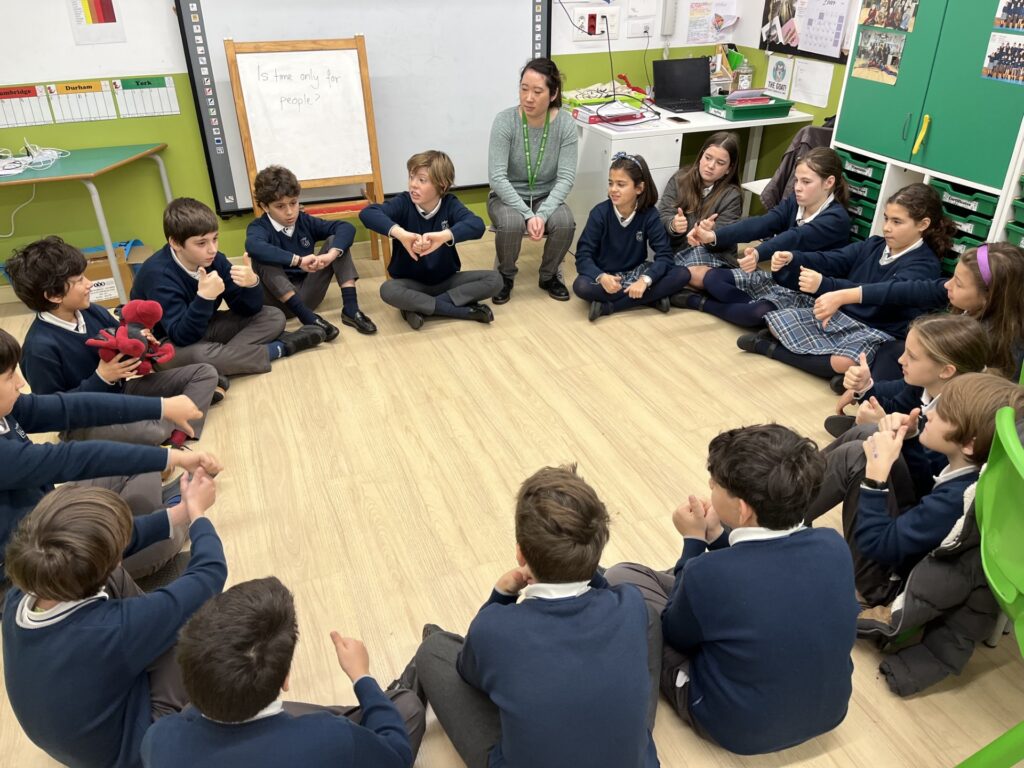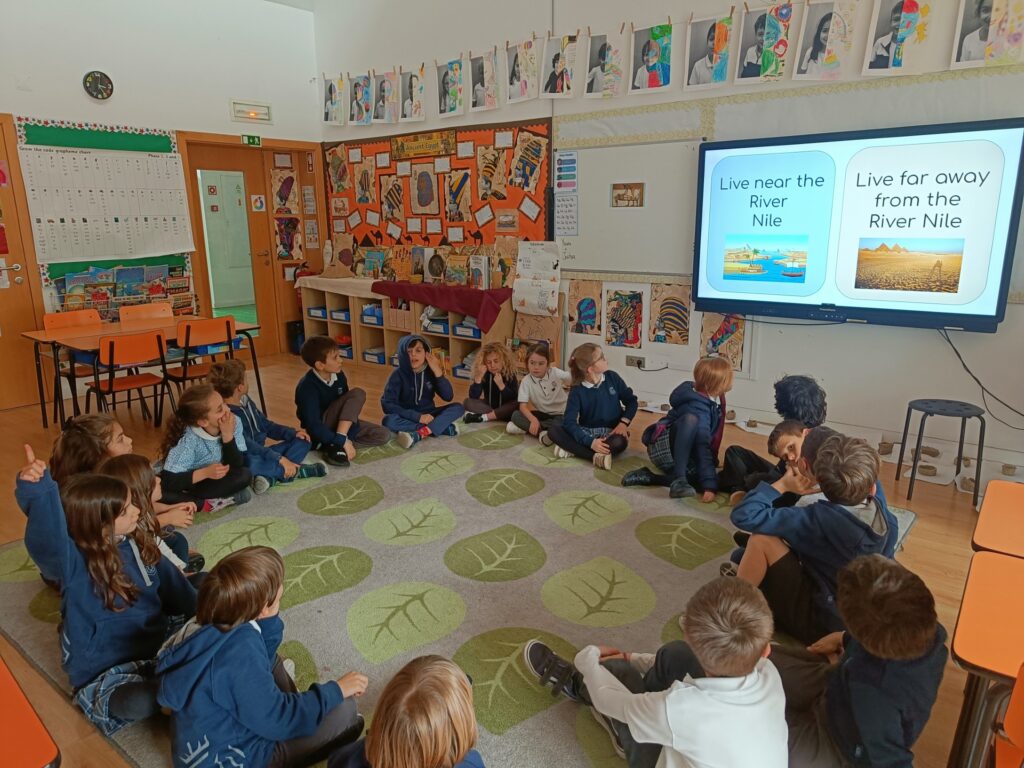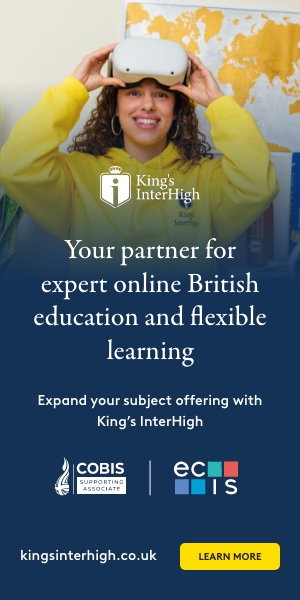As educators, we often find ourselves seeking innovative ways to engage students in meaningful discussions beyond the standard curriculum. There is a need for a new, modernised approach that promotes deep thinking, mutual respect, whilst being practical enough to be implemented across different subjects.
I recall a moment when my youngest son came home one day from school, proudly announcing: “I was a philosopher today.” He was four years old at the time. Upon further investigation, I discovered that he was involved in an initiative called Philosophy for Children, or P4C, which encourages children to explore questions and ideas in a collaborative, non-judgmental setting.

Source: Globeducate
P4C seemed like an ideal way to address the issue of student engagement and improve oracy skills, while also helping students develop essential 21st century core competencies: critical thinking, creativity, communication, and collaboration.
The Problem: Superficial and Surface Level Thinking
The problem was two-fold: some classroom discussions lacked depth, and students were not given ample time to articulate their critical thinking. Teachers were either too quick to accept the first answer provided or students were hesitant to challenge each other’s viewpoints.
One challenge I encountered was fostering critical thinking and respectful dialogue among students, especially in a classroom environment where engagement levels were low. Oracy levels was another focus area, as well as empowering students to express their ideas and reflect upon them. It was important to discover a way to draw out students’ thoughts and give them the tools to question, reason, and explore different perspectives.
The Solution: Implementing P4C in the Classroom
As a global initiative, we launched Philosophy for Children across our entire network of schools and offered professional development courses to interested educators. The core idea was simple: encourage students to engage with philosophical questions in a safe, guided environment. The goal was for our learners to not only understand content, but to learn how to think, communicate, and work effectively with others.
Now in its second year, we have educators using P4C in twenty different schools across eight countries: Spain, UK, Portugal, Italy, France, Cyprus, India, and Canada. Teachers are supported through our well-established Professional Learning Communities (PLCs) – these include regular online meets and a shared working space to upload questions, best practices, and unique solutions.
“It is not just about teaching philosophy: it is about teaching students how to think deeply, reason clearly, and communicate respectfully—a set of skills they can carry with them long after they leave the classroom.”
The Process: P4C in Action
We utilised a ‘community of inquiry’ model, where students sit in a circle and take turns speaking. The aim was not to get the ‘right’ answer, but to think deeply and listen to each other’s perspectives. Acting as facilitators, teachers guide the conversation with open-ended questions, letting students take ownership of the dialogue. The peer-to-peer element was critical. It allowed students to learn from each other, build on each other’s ideas, and challenge assumptions in a respectful manner.
Teachers introduced P4C gradually, beginning with short, structured sessions to help students get used to the format. During the first few sessions, participation was tentative. We quickly realised we needed to create a more inclusive atmosphere, so we incorporated some reflective practices like ‘thinking time’ before speaking. This allowed quieter students to gather their thoughts and feel more confident in sharing ideas.
Each session followed a similar pattern: we started with a short stimulus—this could be a story, a short video, or even an image—that would raise a philosophical question. For instance, “What is fairness?”, “Can we trust what we see?” and “Is it ever okay to break the rules?” The students would then break into small groups to discuss the question before coming back together as a class to share their thoughts. Some teachers also introduced a ‘question of the week’ board, where students could anonymously submit questions that they wanted the class to discuss. This helped teachers to gauge student interests and ensure the discussions felt relevant.

Source: Globeducate
How P4C develops students’ core competencies:
- Critical Thinking: Sessions are centred around complex, open-ended questions, designed to encourage students to think beyond simple answers. Students have to reason through their ideas, reflect on them, and question the perspectives of their peers.
- Communication: Emphasis was placed on listening and communicating respectfully, helping students present their ideas coherently and constructively challenge each other’s opinions.
- Collaboration: The peer-to-peer format allowed students to practice working as a team, sharing ideas and building on each other’s contributions.
- Creativity: To encourage creative problem-solving, it is vital that we provide students with safe spaces to think in new, imaginative ways. The focus is not on providing answers, but on exploring possibilities and considering ‘what if’ scenarios.
The Impact
The outcomes of our action research were promising. Over time, students became more engaged, and discussions grew deeper. They began to challenge each other in constructive ways, asking follow-up questions, and bringing in examples from their own lives. However, it was not always smooth sailing; some students found it difficult to detach from the idea that there was a ‘right’ answer. But the more we practiced, the more they understood that the goal was the process of thinking itself, rather than arriving at a conclusion.
An unexpected benefit was the impact on students’ social skills. Because they were learning how to listen, reason, and build on others’ ideas, the respect they showed each other in these discussions carried over into other classroom interactions. We also noticed improvements in their writing, as they became better at structuring arguments and considering different viewpoints.
P4C is a practical, adaptable tool that can easily be integrated into various subjects. It is not just about teaching philosophy: it is about teaching students how to think deeply, reason clearly, and communicate respectfully—a set of skills they can carry with them long after they leave the classroom. For teachers seeking a practical and innovative approach in their classrooms, Philosophy for Children offers a fresh solution to an age-old challenge—getting students to think.
By Oanh Crouch

Oanh Crouch is a Director of Education at Globeducate and leads on teaching and learning projects, assessment initiatives, curriculum development, global events, and professional learning communities across the group. You can connect with her on BlueSky and LinkedIn.



